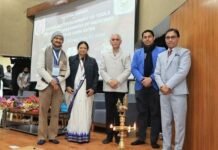New Delhi, March 13: A day after the Lok Sabha passed the Aadhaar bill that seeks to confer statutory legitimacy on the unique identification project that will serve as a central pillar of the subsidy regime, Prime Minister Narendra Modi on Saturday said his government plans to extend the direct benefit transfer to food, kerosene and fertilizers.
Speaking at the Advancing Asia conference jointly organized by the International Monetary Fund and the government of India, Modi said India now has the world’s largest and most successful programme of direct benefit transfer in cooking gas. “We plan to extend it to other sectors such as food, kerosene, and fertilizers. This has improved targeting and the quality of public expenditure,” he added.
The Aadhaar (Targeted Delivery of Financial and Other Subsidies, Benefits and Services) Bill, 2016, was passed by a voice vote in the Lower House, where the governing National Democratic Alliance (NDA) has a commanding majority.
Because it was passed as a money bill, the Rajya Sabha, where the NDA is in a minority, cannot reject the legislation, which means it is well on its way to becoming law. The Upper House can only make recommendations and has to return the bill to the Lok Sabha within 14 days from the date of receipt.
Passage of the legislation will enable the government to reset the subsidy regime and deliver state benefits directly to their intended beneficiaries, plugging leakages. The money will go into the bank or post-office accounts of beneficiaries linked to the 12-digit biometric identity number provided by the Unique Identification Authority of India (UIDAI).
Modi said his government does not intend to rest on these achievements because “my agenda of ‘reform-to-transform’ still needs to be finished”.
“Our recent budget provides a roadmap for our future plans and ambitions. Our underlying philosophy is clear: To create the climate for wealth generation and for that wealth to be spread to all Indians, especially the poor, vulnerable, farmers, and disadvantaged communities,” he added.
Modi said he intends to double the income of farmers by 2022 by increasing irrigation, better water management, creating rural assets, boosting productivity, improving marketing, reducing margins of middlemen and avoiding income shocks.



























